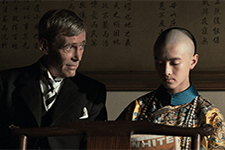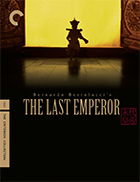The Last Emperor (4K UHD)
|  Bernardo Bertolucci’s The Last Emperor is a grand sweep of a film—a massive, overflowing, almost ridiculously ambitious epic that covers more than six decades of turbulent political and social history. Bertolucci has a love of the intimate, which informs his best films, but he also lusts after the epic, the grandiose, and the larger-than-life. Few filmmakers can marry those two impulses with any real finesse or grace, and Bertolucci certainly comes closer than most, both here and in his 1976 four-hour opus 1900, both of which carry with them a tremendous charge that is never quite overbearing (we can also see it at work in his notorious 1972 masterpiece Last Tango in Paris, which is a character study of such emotional turbulence that it reaches epic proportions). The Last Emperor tells the unlikely, but amazingly true story of Pu Yi, who, in 1908, at the tender age of 3, was taken from his mother and made emperor of China. Installed on the Dragon Throne in Peking’s Forbidden City, a massive imperial palace that covers 180 acres and has nearly 10,000 rooms, the child was given command over a third of the world’s population. However, he was deposed in 1912 after China’s republican revolution, but he was still allowed to maintain his status as emperor in the Forbidden City, even though all the pomp and circumstance and power were ultimately empty gestures clinging to a quickly fading past. In 1924 he was evicted from the Forbidden City by Nationalist forces, and he escaped into a life as a playboy swinger until being reinstated as emperor of Manchuria by Japanese forces during World War II, where he played the role of puppet leader. At the end of the war, he was captured by Soviet forces, and in 1950 was returned to China where he was labeled a war criminal and spent nine years being re-educated under Mao’s communist regime before being released. He died less than 10 years later as a simple gardener. As I said, unlikely, but undoubtedly true. You can’t make this stuff up. Bertolucci and his co-screenwriter Mark Peploe (The Passenger) clearly relish the virtually absurd sweep of this man’s life, and they fashion their narrative in terms of flashback, beginning the film with Pu Yi’s return to China in 1950, which allows them to open their story in the drab grays and browns of the communist state before flashing back to the intensive reds and yellows of the imperial past. This is not, however, a simple color dichotomy representing the dreary present and the bountiful past. Bertolucci is certainly seduced by the grand pageantry he was able to restage by shooting within the walls of the actual Forbidden City (he got to use real history as his set) and having use of thousands of Chinese soldiers as extras to create the kind of impressive widescreen vistas of human spectacle that is now almost the sole province of digital special effects. At the same time, though, there is a nagging sense of emptiness to it all, as a child is handed absolute power simply because a dying empress decreed it. As a character, Pu Yi is an odd protagonist. From the moment we meet him, he is constantly acted upon. Part of the film’s underlying irony is that this supposedly powerful ruler—the “Lord of 10,000 Years,” as he is declared—spends his entire life being manipulated by those around him, whether it be the scheming wives of the former emperor, or the eunuchs who are ostensibly there to serve him, or the Japanese invaders who see him as a willing collaborator simply because he is so deluded into thinking he is an emperor again. He is played by four different actors throughout the film: Richard Vuu at age 3, Tsou Tijger at age 8, Tao Wu at age 15, and finally by John Lone as an adult. And, unlike many biopics in which a character passes through the stages of life, there is a real connection among the performers. Each in his own way captures Pu Yi’s fundamental lack of presence in his own life. Moving from stage to stage, he is not so much a victim of his circumstances as he is simply a vaguely engaged participant. The moments when he does try to take control of his life are genuinely moving precisely because they are so rare. The mirroring scenes in which he chases after his wet nurse who is being forcibly removed from the palace and then when he chases after his wife (Joan Chen) when she is removed by the Japanese summarize his ultimate impotence in the face of larger forces. It would seem that having such a passive central character would gut the film, especially at its hefty length of more than three hours, but The Last Emperor grips from its very first frames and maintains its hold. Using a fragmented flashback structure helps because it situates even the most glorious moments of power and pageantry within a framework of historical change; however beautiful it may be, it won’t last. One decided weakness in this thoroughly international production was Bertolucci’s decision to have all the characters speak English, rather than their native languages, which gives an impression of theatricality to a film that is otherwise thoroughly rooted in the kind of historical reconstruction that can make you forget you’re watching a film and not living history. However, Bertolucci should be commended for telling the story from the perspective of the Chinese and not introducing a Western interloper to frame it (Peter O’Toole plays Pu Yi’s Scottish tutor during his teenage years, but he is primarily a marginal character, important only insofar as he represents just how little contact with the outside world Pu Yi had until his 20s). Moreso than most historical epics, we feel the real pull of history and the whiplash of violent social change, but most of all the steady march of life. It is never entirely clear exactly how Bertolucci wants us to view Pu Yi, especially in his later years when he is re-educated and embraces a simple life. Is he truly happy now? Has he been re-educated in the communist sense, or has he just survived the insane arc of his life? It is entirely possible that Bertolucci doesn’t want us to have a clear picture of Pu Yi, which avoids the trap of using his life to make a “statement.” By the end of The Last Emperor, we’re not sure exactly what Pu Yi’s life has amounted to, but we do know that it has been truly extraordinary.
Copyright © 2024 James Kendrick Thoughts? E-mail James Kendrick All images copyright © The Criterion Collection | |||||||||||||||||||||||||||||
Overall Rating: 


 (3.5)
(3.5)


